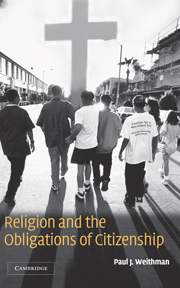Book contents
- Frontmatter
- Contents
- Preface and acknowledgments
- Introduction
- 1 Participation, full participation and realized citizenship
- 2 Religion's role in promoting democracy
- 3 Conceptions of the democratic citizen
- 4 Public argument
- 5 The principles
- 6 Robert Audi on secular reasons
- 7 John Rawls on public reason
- Conclusion
- Select bibliography
- Index
4 - Public argument
Published online by Cambridge University Press: 22 September 2009
- Frontmatter
- Contents
- Preface and acknowledgments
- Introduction
- 1 Participation, full participation and realized citizenship
- 2 Religion's role in promoting democracy
- 3 Conceptions of the democratic citizen
- 4 Public argument
- 5 The principles
- 6 Robert Audi on secular reasons
- 7 John Rawls on public reason
- Conclusion
- Select bibliography
- Index
Summary
It is time to take stock. I have introduced the notions of participation and full participation, argued that the status of full participation is highly valued and that the conditions of both participation and full participation are politically contested. I have used these notions to locate the contributions churches make to democracy. Churches contribute to their members' realization of citizenship, which is an important part of full participation. They also contribute to public political debate and public civic argument about the conditions of participation and full participation. Having used the notions of participation and full participation to locate the contributions of churches, I dropped the assumption of their importance. I argued that the contributions churches make to democracy should be valued by proponents of a number of democratic theories, none of which makes use of the concepts of participation, full participation or realized citizenship.
In chapter 5 I shall use the conclusion that churches contribute to democracy to argue for the claims about religion and democratic decision-making which I laid out in the introduction. Those claims are:
(5.1) Citizens of a liberal democracy may base their votes on reasons drawn from their comprehensive moral views, including their religious views, without having other reasons which are sufficient for their vote – provided they sincerely believe that their government would be justified in adopting the measures they vote for.
(5.2) Citizens of a liberal democracy may offer arguments in public political debate which depend upon reasons drawn from their comprehensive moral views, including their religious views, without making them good by appeal to other arguments – provided they believe that their government would be justified in adopting the measures they favor and are prepared to indicate what they think would justify the adoption of the measures.
- Type
- Chapter
- Information
- Religion and the Obligations of Citizenship , pp. 93 - 120Publisher: Cambridge University PressPrint publication year: 2002

